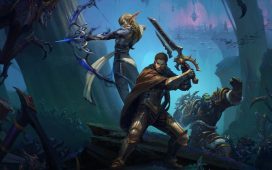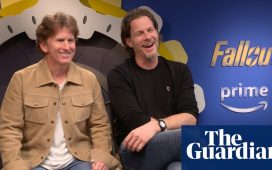Art
It looks as if the universe was designed by a Romantic painter. Great glowing clouds of smoke and mist hang in the void with twinkling stars spangled within them. Instead of lonely bright dots in black nothingness, as space used to be pictured, it turns out to be a sublime storm of dazzling richness. The Pillars of Creation is the photo that made the Hubble telescope’s name. It shows a star-forming region of the Eagle nebula, 7,000 light years from Earth. In 2015 Nasa released a second, even more detailed and glorious Pillars of Creation). The successful launch of the new James Webb telescope has eclipsed Hubble, but as it “sees” in infrared, it is unlikely to provide similarly beguiling pictures. The Hubble Age is ending but it changed our cosmic perception for ever. Jonathan Jones
Music

Although Cosmia might initially seem like the most logical choice from Joanna Newsom’s stellar 2006 album Ys, it is Emily that contains the most galactic insight. A delicate blend of strings and harp, it is part childlike Disney song, part space-folk odyssey, trembling and spiralling in directions you might not expect but always returning to home via Newsom’s inimitable, dexterous vocal. Her technical references to meteorites and meteoroids might be a little confused (very likely a deliberate plot device), but don’t let that put you off: this tale of siblings grown apart deploys evocative science metaphor much better than most. Jenessa Williams
Book

In Frederik Pohl’s Hugo and Nebula award-winning novel Gateway, humans use a strange alien technology to hurtle off into other galaxies. Some come back with untold riches. Some don’t come back at all. This intergalactic game of Russian roulette makes for a superb sci-fi premise, but there is far more to the book. Pohl creates a powerful sense of an incomprehensible multiverse – then measures humanity up against it. He makes us seem very small compared with the vast mystery of space, but he also shows how overwhelming and all-consuming emotions such as anger and regret remain. He demonstrates that there are also universes to explore within the human mind – and the cosmos feels even bigger as a result. Sam Jordison
Game

Space is big. Like, really, unnecessarily, I’ve-given-myself-a-hernia-just-thinking-about-it big. No game has nailed this existentially alarming sense of scale better than Hello Games’s constantly evolving astral voyage simulator No Man’s Sky. It’s just you, a spaceship, and a whole galaxy to explore. Through some daffy algorithmic magic, the game procedurally creates its worlds on the fly – a whopping 18 quintillion of them – meaning each place you visit is unlikely to be seen by anyone else for the rest of time. This same randomising tech witchcraft also sculpts each biome’s plants and animals, meaning each world is resplendent with weird, wonderful and utterly unique life. For sheer, slack-jawed cosmic scope, No Man’s Sky is unrivalled. Just point the nose of your ship at the heavens, pick a star, and off you go. Luke Holland
Film

The greatest movies about outer space (Kubrick’s 2001: A Space Odyssey, Tarkovsky’s Solaris) are also explorations of the space within. So while, galactically speaking, Duncan Jones’s Moon is set right next door on our very own friendly satellite, its themes of identity, humanity and the meaning of home are, well, universal. As the supposedly lone technician on a lunar base who discovers his wounded doppelganger in a wreck on the moon’s surface, Sam Rockwell gives a lovely rumpled performance: an everyman discovering he might not be anyman at all. And, as opposed to the aforementioned touchstones, Moon satisfies as a classical mystery; perfect for those times in life when one wants to contemplate cosmic questions, but also wouldn’t mind a few answers. Jessica Kiang














